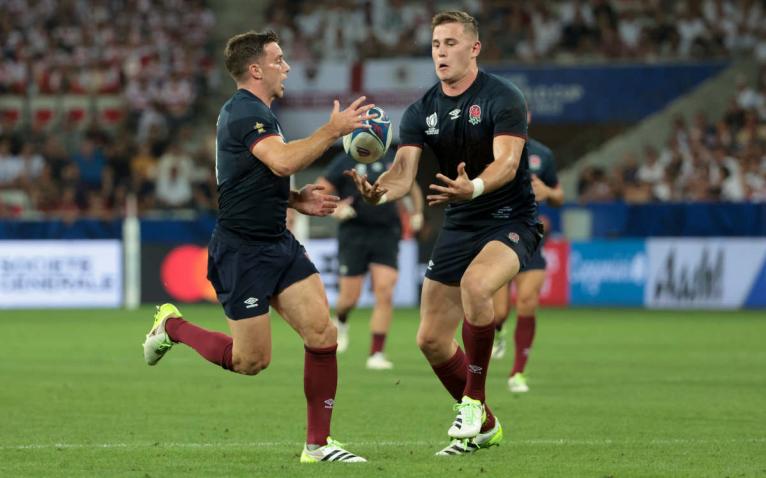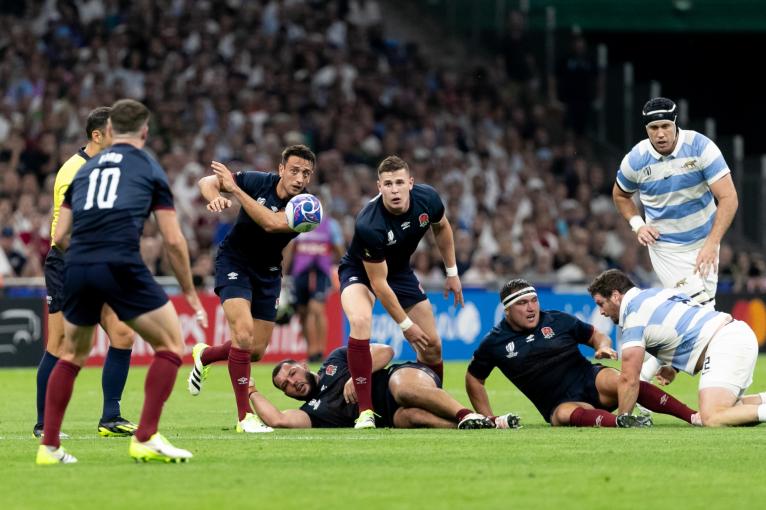If there is a phrase to quicken the rugby pulse at present, odds are it isn’t “We will win by any means necessary”. It’s a formulation that keeps popping up around the England camp, as rampant as sunflowers under a southern French sun – only not as pretty.
The dictum of winning by any possible means – of putting pragmatism before flair – appears to be at risk of becoming an unthinking mantra, as deadening to players’ sense of verve as it is to fans’ sense of excitement.
While Maro Itoje was dishing out a hefty dose of sporting realism in Nice ahead of England’s match with the Brave Blossoms – “We would like to score loads of tries but for me it is by any means necessary” – Matt Dawson was striking the same note of English pragmatism while back in the Home Counties. “It’s about winning the game by all means necessary,” the 2003 World Cup-winner told me on the eve of the match.
And look at what’s followed since the win against Japan: a whole fusillade of pragmatism, even from those who can usually be counted upon to be the loosest of cannons. Joe Marler – one of Nature’s freer spirits, both in word and deed – led the charge in defending England’s less-than-enchanting game plan. “Finesse? Why do you have to finesse it?” he said on Monday. “You’ve just got to win haven’t you? What did England do 20 years ago? Find a way to win in the World Cup.” And that from a usually adventure-minded Harlequin, too. England, claims Marler, won ugly for much of the triumphant 2003 campaign. George Ford issued similar sentiments in the immediate aftermath of Sunday’s Pool D victory.
England appear to have become an entire regiment of pragmatists, from general Borthwick down to the rank-and-file. In such circumstances, it’s hard to resist drawing a contrast with the national side’s endeavours in another sport. In Test cricket, Bazball has seen the shackles fall off mind and body, and the victories have flowed like tributaries of fine Burgundy. In rugby, the opposite has been occurring – a self-inflicted shuffle towards the gallow of sporting inhibition, with little to savour along the way save tepid tap water. It’s as though England’s sporting culture is performing its own illustration of Newton’s Third Law of Motion. To every action there is always an opposed equal reaction. As England’s cricketers come out of their shells in a beautiful, outward-looking act of multi-faceted flourishing, so in proportion do the country’s rugby players retreat into a cocoon of self-smothering one-dimensionality.

But rugby, it may quite reasonably be pointed out, isn’t a beauty contest. Remember the Boks of Bakkies Botha? And, besides, in the act of winning ugly there can be a strange, transfixing kind of beauty; the beauty of single-minded devotion to a cause that rejects the seductive calls of something more breathless. Beauty and ugliness may be opposites, but they lie on the border of one another.
It shouldn’t be overlooked that Sunday’s bonus-point victory means England are now two-from-two, having negotiated the hardest matches in their group: a clash with a genuine southern hemisphere contender in Argentina, and a riviera banana skin in the form of Japan. England sit pretty at the top of Pool D, even if the rugby itself hasn’t been pretty. If not quite a quantum leap from the turgid hopelessness of their summer warm-up games, only the sourest-faced misery guts would deny that this at least represents some progress. There was a pre-tournament chorus of doom whose dominant melody suggested that England may not even make it out of their pool, yet here they are now incontrovertibly in prime position to finish top.
Nobody remembers if it was tries, penalties or drop goals. It’s about winning the game by any means necessary.
Matt Dawson
So, chapeau, you might say. But only quietly. And only with the slightest doffing of the hat.
England are getting the job done. Yet watching them, at the moment, can feel just that – a job rather than a pleasure.
It boils down to this. At what price victory? To return to the comparison with leather-on-willow, most cricket fans – I suspect – would have taken a 2-2 Ashes tie played in the joyous, life-affirming, blizzard-like style of Bazball rather than a 1-0 series victory achieved through a process of studied conservatism and cold-blooded attrition. But perhaps it all boils down to temperament. Are you more of a hare than a tortoise? More maverick than monk? Cavalier or Roundhead?
Matt Dawson knows where he sits in the debate. “Somethings never change at a world cup,” he says. “It’s about winning the game – people remember who lifts the trophy but few remember the journey. Nobody remembers if it was tries, penalties or drop goals. It’s about winning the game by any means necessary. I was so pleased to see George Ford slot those drop goals against Argentina. It’s a great tactic and I hope they use it throughout the whole tournament.”

The drop goal is the pragmatist’s trump card – an embodiment of rugby prudence. Its finest practitioners marry dead-eyed accuracy with ice-cold self-belief and a half-sadistic sense of just how to break the opposition’s resolve.
“Drop goals just fell out of fashion,” observes Dawson, who knows a thing or two about manoeuvring a drop-kicker into position. “Teams started backing themselves to score tries or go through the phases and then get a penalty. I’ve been beating the drum for 15 years in commentary about taking the points from drop goals and then walking away.
“People don’t always understand what being on the end of a drop goal does to you. I’ve been on the receiving end, including the quarter-final in 1999 when Jannie de Beer kicked all those goals. When you are doing nothing wrong and you’re defending brilliantly well, and then you’re three, six, nine points down due to drop goals, there is a rage and frustration. And then you start making bad decisions because you are chasing the game.”
Pragmatism is spreading, and it doesn’t always have a dull aspect. Look at Fiji. Against Australia, the great entertainers moderated all their flamboyant instincts to ensure they pulled off a win.
Rage and frustration. The England fans who booed their side in Nice due to an attacking formula that appeared to robotically default to kicking perhaps have an inkling of the latter emotion, if not the former. Rage would be an incongruous emotion to feel at being top of the log, yet frustration is entirely understandable when a team seems to be functioning as a kind of half-team, as a side failing to maximise the giddy potential of attack-minded souls such as Marcus Smith and Elliot Daly.
The paradox is that England’s group-stage pragmatism may turn out not to be so pragmatic in the longer term. It may help them climb the foothills of the pool stage. But up against the stronger opposition they will inevitably face in the steeper terrain of the knock-out stages it is unlikely to be enough. Or at least it won’t be enough as it’s being delivered at present. England cannot deliver the jugular-pressing 10-man rugby of a South Africa because their pack is not consistently, sufficiently dominant. If England are to trouble sides in the knock-out phase then there will need to be more in their repertoire than the current cautious pragmatism, with its apparent reluctance – even antipathy – to keep ball in hand.
Yet the pragmatism is spreading, and it doesn’t always have a dull aspect. Look at Fiji. Against Australia, the great entertainers moderated all their flamboyant instincts (well, most of them) to ensure they pulled off a win that serves to make Pool C a cacophony of jangling nerves for the Wallabies and Wales. Naturally, the Pacific Islanders still had an edge of sparky innovation to them – but a “take the three” approach eclipsed their attacking instincts, and they placed a premium on laser-focused power rather than instinctive distribution.

To complain that Fiji are no longer fun to watch because they have ceased to fling the ball around like the Harlem Globetrotters would be wide of the mark. Quite the opposite, in fact. For years – decades, even – they have never quite succeeded in tempering their effervescent, Sevens-style instincts in order to bring more structured physicality to bear. Until now. And that brings its own joy – the joy of witnessing a side come of age and harness all that never-in-doubt potential in a winning direction.
Still, it’s perhaps enough to make us ask – along with Danny Cipriani – where all the game’s creative decision-makers have gone. Where are the cavaliers? The nonconfirmists, the mavericks, the originals? Rugby needs them, as does life. The answer is that they are still there. Smith, Daly and Henry Arundell all still have the rare spark and audacity that made them stand out in the first place, it’s just that they’ve been muffled by the P-word.
The same can be said of Alex Mitchell, who in the space of a couple of months has gone from overlooked scrum-half to starting nine. As Northampton fans know, Mitchell can be a scampering, quick-witted demon with ball in hand, scenting space around the fringes and exploiting it in the blink of an eye. Yet against Japan he appeared neutered by the wider attacking structures being imposed upon him and the rest of the side.
Mitch should have been in the squad from the beginning. He offers something different but in a controlled manner. He’s a bit like Jack van Poortvliet, but seems to have a little bit more wisdom in the way he plays.
Matt Dawson
Mitchell sought to generate early attacking tempo with some snappy ruck distribution, but he quickly began to resort to the boot rather than seeking space through a passing game. The gulf between his individual instincts and the team straitjacket was thrown into sharp relief early in the second half when he squandered precious field position to kick the ball dead. The boos began. Mitchell looked disgusted with himself. Only his true self wasn’t on the pitch to be disgusted with – it was some other artificial self, a simulacrum of who and what he actually should be on a rugby field.
Dawson believes England should stick with Mitchell – and it is Mitchell’s attacking repertoire that Dawson is quick to emphasise.
“Mitch should have been in the squad from the beginning,” says Dawson. “He offers something different but in a controlled manner. He’s a bit like Jack van Poortvliet, but he seems to have a little bit more wisdom about the way that he plays. He has a calmness and an ability to bring in the players around him, to read the game and to run supporting lines. He manipulates the opposition really well.

“Alex is definitely the right person to be in the number nine jersey at the moment and it gives England some consistency if they continue with him.”
William Blake’s poem London speaks of “mind-forged manacles” – those tricks of the mind that tie us up on knots, drag us down and prevent us from becoming what we can truly be. We can be the architects of our own limitations. England’s emphasis on pragmatism – on “winning by any means necessary” – looks suspiciously like one such manacle. Alex Mitchell and his team-mates need to throw off the yoke. It’s time to saw off the chains and see just how joyously this England side can run.
Matt Dawson has teamed up with The National Lottery to celebrate individuals who have done extraordinary things in their communities and beyond, showcasing the importance of funding for grassroots clubs like Saracens, shining a light on how the £30m raised a week goes towards good causes https://www.


Interesting he now has this attitude towards how England are playing, I'm pretty sure pre world cup he was lambasting them for playing terribly, boring and kicking the ball. However now they're winning doing it then its ok? So capricious of him.
Yet more bandwagon jumping from the journos, trying to make big stories out of nothing. Every team plays in a slightly different way depending on their coach, nothing new there. The whole point of rugby is that there are multiple ways to get the win, a team can use its strengths or exploit weaknesses in others.
This is so boring now.
England has decided to try and win this World Cup “ugly”. Because they’ve had a change in coach, and a break in continuity compared to teams who’ve had 4+ years to prepare for this World Cup. It’s a conservative approach born of necessity. A good option given the circumstances. Get the basics right. Defence, breakdowns, set piece.
Rather watch them lose playing “beautifully”? Okay. Tell that to the Wallaby critics. Here you have a coach (love EJ or loathe him) picking a young side, taking risks with the same problem of a short handover of coaching reins right before a World Cup.
Fickle.
But what really frustrates me is how the Boks were lambasted for “winning ugly”. Same problem - short handover to Rassie from Coetzee do what it takes to go from no. 6 to 2019 WCs in 18 months, transform the team demographically. Now these fickle pundits come out in supporting of winning ugly.
I say let the boys play. Let the teams showcase what they have as at 2023. Draw a line in the sand. Let’s see what style, tactics and innovations at this marker in rugby history wins the cup. That in itself is beautiful, and interesting.